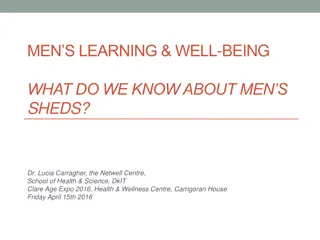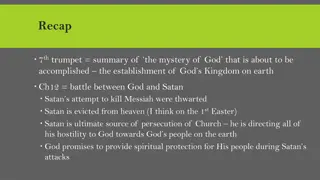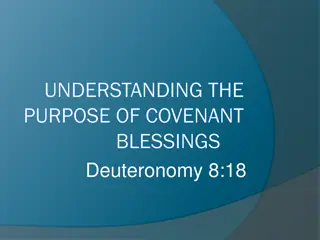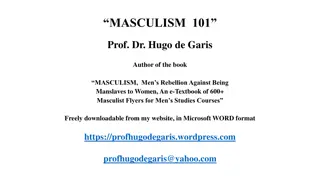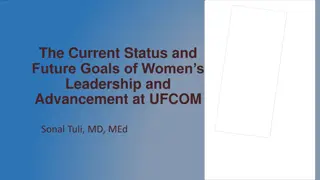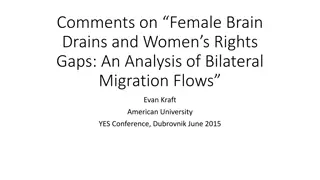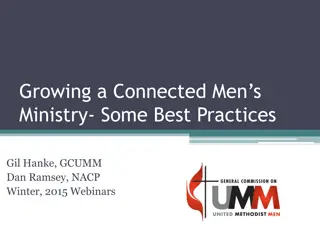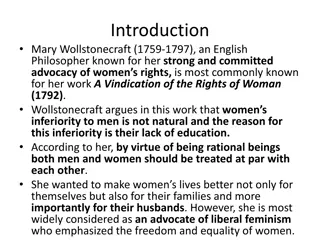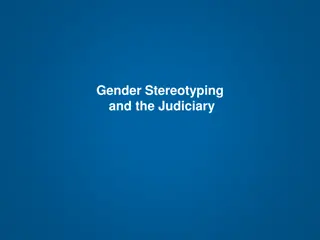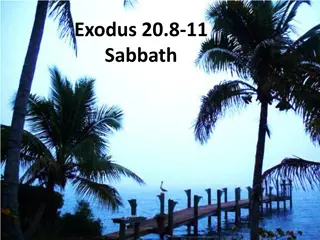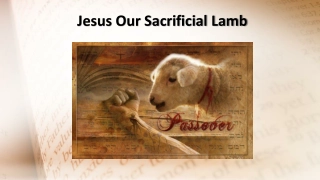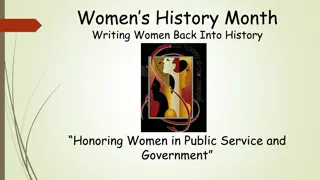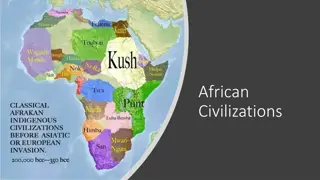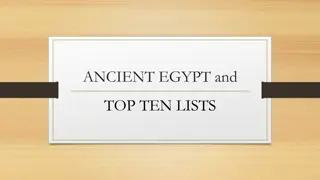Unveiling the Role of Men and Women in the Kingdom of God
Explore the portrayal of men and women in the Kingdom of God through biblical texts, ancient language translations, and scholarly insights. Delve into the significance of gender roles, linguistic interpretations, and historical context to understand the dynamics at play in the sacred narratives.
Download Presentation

Please find below an Image/Link to download the presentation.
The content on the website is provided AS IS for your information and personal use only. It may not be sold, licensed, or shared on other websites without obtaining consent from the author. Download presentation by click this link. If you encounter any issues during the download, it is possible that the publisher has removed the file from their server.
E N D
Presentation Transcript
Being God s Image Women and Men in the Kingdom of God
The Big But... 1 Tim 2:12
How do we translate ancient languages? Compare the same text in other (known) languages. Similarities with related languages Crack the code
What do we do if a word only occurs once in the Bible? Compare the same text in other languages. See how the word is used outside the Bible Similar time period Similar type of literature Guess based on context or other data.
An example The king and his men marched to Jerusalem to attack the Jebusites, who lived there. The Jebusites said to David, You will not get in here; even the blind and the lame can ward you off. They thought, David cannot get in here. Nevertheless, David captured the fortress of Zion which is the City of David. On that day David had said, Anyone who conquers the Jebusites will have to use the water shaft to reach those lame and blind who are David s enemies. That is why they say, The blind and lame will not enter the palace. 2 Sam 5:6 8 (NRSV) Hebrew: Tzinor No idea what it means.
The Big But... 1 Tim 2:12
Dr. Linda Belleville (PhD, University of Toronto) Adjunct Professor of New Testament Cornerstone University (Formerly Grand Rapids Theological Seminary)
I desire, then, that in every place the men should pray, lifting up holy hands without anger or argument; also that the women should dress themselves modestly and decently in suitable clothing, not with their hair braided, or with gold, pearls, or expensive clothes, but with good works, as is proper for women who profess reverence for God. Let a woman learn in silence with full submission. I permit no woman to teach or to have authority over a man; she is to keep silent. For Adam was formed first, then Eve; and Adam was not but the woman was deceived and became a transgressor. Yet she will be saved through provided they continue in faith and love and holiness, with modesty. 1 Tim 2:8 15 (NRSV)
What does Paul desire for men? I desire, then, that in every place the men should pray, lifting up holy hands without anger or argument; also that the women should dress themselves modestly and decently in suitable clothing, not with their hair braided, or with gold, pearls, or expensive clothes, but with good works, as is proper for women who profess reverence for God. 1 Tim 2:8 10
What does Paul desire for women? I desire, then, that in every place the men should pray, lifting up holy hands without anger or argument; also that the women should dress themselves modestly and decently in suitable clothing, not with their hair braided, or with gold, pearls, or expensive clothes, but with good works, as is proper for women who profess reverence for God. 1 Tim 2:8 10 What is modesty?
What is Modesty? I desire, then, that in every place the men should pray, lifting up holy hands without anger or argument; also that the women should dress themselves modestly and decently in suitable clothing, not with their hair braided, or with gold, pearls, or expensive clothes, but with good works, as is proper for women who profess reverence for God. 1 Tim 2:8 10 How does our definition of modesty differ?
Have you ever heard this? We should wear our best to church because we are coming to the LORD s house. After all, if you were going to meet the Queen (King) of England you would put on your finest clothes. Shouldn t you give God as much respect as you would the Queen (King) of England?
An Easily Overlooked Command Let a woman learn in silence with full submission. 1 Tim 2:11 What is the verb in this sentence?
An Easily Overlooked Command Let a woman learn in silence with full submission. 1 Tim 2:11 What is the verb in this sentence? Manthan t ( ) It s an imperative: a command.
Whats remarkable about this command? The education of women was not valued. In some circles, the religious education of women was unacceptable. Paul s command that women learn is an expression of value, that is quite remarkable.
Some Quotes from Last Week The woman taught once, and ruined all. On this account therefore he [Paul] says, let her not teach. But what is it to other women that she suffered this? It certainly concerns them; for the sex is weak and fickle. John Chrysostom (347 405 CE) Whoever teaches his daughter Torah, teaches her obscenity. m. Sotah 21 (~200 CE)
The Big But... I permit no woman to teach or to have authority over a man; she is to keep silent. 1 Tim 2:12
Greek Sentence Diagram (I) do not permit Implied Subject a woman Direct Object to teach to have authoritya man Verb nor 2 Subordinate Clauses
Two Interpretive Challenges (I) do not permit Implied Subject a woman Direct Object to teach to have authoritya man Verb nor 2 Subordinate Clauses
To Have Authority Greek: authentein ( ) Hapax Legomenon Only used 1x in the entire Bible. How do we know what it means? Classical Greek Literature to murder Other common language sources to domineer/dominate to originate Given the context, which meaning fits best?
Two Interpretive Challenges (I) do not permit Implied Subject a woman Direct Object to teach to have authoritya man Verb nor 2 Subordinate Clauses
How do we translate the 2 subordinate clauses? How do they relate to the verb: I do not permit? Neither-Nor construction In the New Testament there are 6 ways to translate a neither-nor construction in Greek. Examine all 6 options to see which makes sense.
Option 1: Synonyms You know that it was because of a physical infirmity that I first announced the gospel to you; though my condition put you to the test, you did not scorn or despise me, but welcomed me as an angel of God, as Christ Jesus. Gal 4:13 14 Does this match the usage in 1 Tim 2:12? No. to teach and to dominate are not synonyms.
Option 2: Closely Related Ideas But you, beloved, are not in darkness, for that day to surprise you like a thief; for you are all children of light and children of the day; we are not of the night or of darkness. 1 Thess 5:4 5 Does this match the usage in 1 Tim 2:12? No. to teach and to dominate are not related ideas.
Option 3: Antonyms (Opposites) There is no longer Jew or Greek, there is no longer slave or free, there is no longer male and female; for all of you are one in Christ Jesus. Gal 3:28 Does this match the usage in 1 Tim 2:12? No. to teach and to dominate are not opposites.
Option 4: General to Particular Yet among the mature we do speak wisdom, though it is not a wisdom of this age or of the rulers of this age, who are doomed to perish. 1 Cor 2:6 Does this match the usage in 1 Tim 2:12? No. to teach is not the general nor to dominate the particular. If so, the word order would be reversed.
Option 5: A natural progression of closely related ideas But to all who received him, who believed in his name, he gave power to become children of God, who were born, not of blood or of the will of the flesh or of the will of man, but of God. John 1:12 13 Does this match the usage in 1 Tim 2:12? No. to teach and to dominate are not a progression of closely related ideas.
Option 6: A related purpose or goal Do not store up for yourselves treasures on earth, where moth and rust consume and where thieves break in and steal; but store up for yourselves treasures in heaven, where neither moth nor rust consumes and where thieves do not break in and steal. Matt 6:19 20 Does this match the usage in 1 Tim 2:12? This is the best candidate.
Lets look more closely NRSV Translation I permit no woman to teach or to have authority over a man; she is to keep silent. 1 Tim 2:12 Option 6 Translation I do not permit a woman to teach for the purpose of dominating a man; she is to keep silent. 1 Tim 2:12
A Better Refinement NRSV Translation I permit no woman to teach or to have authority over a man; she is to keep silent. 1 Tim 2:12 Option 6 Translation (Refined) I do not permit a woman to teach a man in a domineering way but to have a quiet demeanor. 1 Tim 2:12
A Parallel Example: Option 6 Translation (Refined) I do not permit a woman to teach a man in a domineering way but to have a quiet demeanor. 1 Tim 2:12 To the church at Thyatira: But I have this against you: you tolerate that woman Jezebel, who calls herself a prophet and is teaching and beguiling my servants to practice fornication and to eat food sacrificed to idols. Rev 2:20
A Third Interpretive Challenge (I) do not permit Implied Subject a woman Direct Object to teach to have authoritya man Verb nor 2 Subordinate Clauses
Third Interpretive Challenge Greek has 1 word for man or husband (aner). Greek has 1 word for woman or wife (gyne). How do you know which English word to use? Context. Generally (not always) if they appear in the same sentence together, it means husband and wife.
An Equally Viable Translation (I) do not permit Implied Subject a wife Direct Object to teach Verb a husband nor to have authority 2 Subordinate Clauses
Where does that leave us? Option 1: I do not permit a woman to teach a man in a domineering way but to have a quiet demeanor. Option 2: I do not permit a wife to teach a husband in a domineering way but to have a quiet demeanor. Is this a universal prohibition of women teaching men?
Another Clue... Now there came to Ephesus a Jew named Apollos, a native of Alexandria. He was an eloquent man, well-versed in the scriptures. He had been instructed in the Way of the Lord; and he spoke with burning enthusiasm and taught accurately the things concerning Jesus, though he knew only the baptism of John. He began to speak boldly in the synagogue; but when Priscilla and Aquila heard him, they took him aside and explained the Way of God to him more accurately. And when he wished to cross over to Achaia, the believers encouraged him and wrote to the disciples to welcome him. On his arrival he greatly helped those who through grace had become believers, for powerfully refuted the Jews in public, showing by the scriptures that the Messiah is Jesus. Acts 18:24 28 What is Priscilla s role in Apollos s instruction?
Summary Paul commands women to learn. Contrary to [some] practices of the day. The verb authentein (to have authority) is a very rare word of varying meaning. Best option is to dominate. The neither-nor subordinate clauses are best translated as for a purpose or goal, reflecting motive. Paul s statement is not a universal prohibition of women teaching; it is a prohibition against teaching with the wrong motives.
Next Week Read 1 Tim 2:13 15 What is Paul s argument? How are women saved through childbirth?



